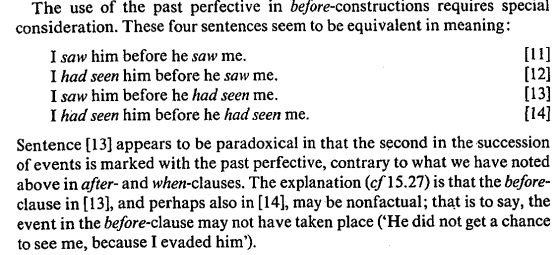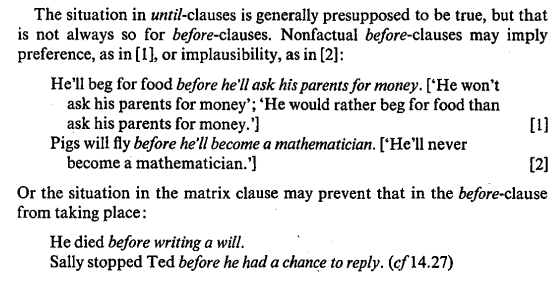Just saw this sentence in Quirke's Grammar:
I saw him before he had seen me.
full context:
in 15.27 he says
The last example "Sally stopped Ted before he had a change to reply' doesn't use the perfect, so why is it used in 'I saw him before he had seen me"? [13] just looks weird to me - as if perfect places him seeing me before me seeing him and the 'before' clause places me seeing him squarely before him seeing me, which is confusing. Are they both in so-called 'past in the past', like "I told him that I had seen him before he had seen me"? I understand that time is subjective and 'simple' tenses don't have much to do with time at all, but it makes this construction even more confusing to me.
Even Cambridge's Grammar says that that the event expressed in before complement takes place subsequently and has this example:
She left the country before she had written her thesis allows (and indeed suggests) that she had started writing when she left and is thus not equivalent to She left the country before she wrote her thesis, which indicates that the leaving preceded the whole of the thesis writing.
I don't understand why 'had written' suggests that she had started writing when she left.
Lewis Michael's The English Verb says:
The past retrospective is similar in every way to the present retrospective except that instead of the events being before Now, they are before a particular point in Past Time." - Present retrospective is used to 'look back' on things and is deeply rooted to the point Now. Looking at, back, or forward is possible with remote forms, expressing the fact that the speaker views things from a point remote in time.
Does this mean that the speaker uses the 'I saw him' as a point to look back on thing? How does that works when when it's in a before-clause?
I get the meaning of the sentence, but I don't get why it's constructed like that. What am I missing?
Thanks.
Another example:
Snape had struck before Harry was ready, before he had even begun to summon any force of resistance.
Note: I've read previously-asked questions about similar topics and the answers given didn't provide much clarity on the subject. Maybe I'm just bad at reading.


